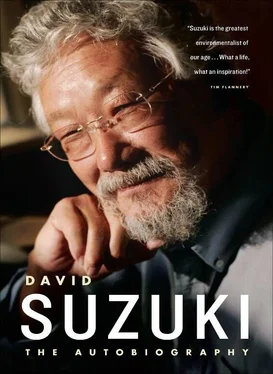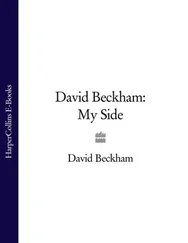Two hours' drive from Port Douglas is the Daintree, a jewel of tropical rain forest that is easily accessible and delightful to explore. Yet in the adjacent lands around it, lots are being cleared and sold off for development. Every time I've visited the Daintree, I've been overwhelmed by the immensity of our ignorance and our arrogance in the way we treat nature. A few years ago, biologists “fogged” some of the canopy of the Daintree with pesticide, just as research entomologist Terry Erwin of the Smithsonian Institution had done in the Peruvian Amazon, and, like Erwin, they found thousands of species of insects that had never before been seen by humans. It is thought there must be tens of thousands of species in the Daintree yet to be discovered.
But remember, when a new organism — plant, animal, or micro-organism — is collected, it can be “keyed out,” meaning its taxonomic position is identified, and if it is new to science, it can be named. When a name is assigned to a new species, that does not mean we know anything about its numbers, distribution, habitat needs, or interaction with other species or even such basic biology as what it eats, how it reproduces, or when it matures. It is breathtaking, therefore, that even though we remain almost completely ignorant of most of the species' needs and interactions with ecosystems, we do not hesitate to destroy those ecosystems to get a few “resources” that we find useful. We should remember the story of the goose that laid golden eggs and realize that entire ecosystems like the Amazon and Daintree forests are the goose. Only so long as they flourish will we be able to collect the golden eggs.
BEFORE MY THIRD VISIT to Australia, I received a message that someone named Peter Garrett, who sang with an Australian group called Midnight Oil, had offered to do an event with me in Sydney on my next visit. I wrote to ask Patrick Gallagher who this guy was and whether he was legit. Patrick replied that he was a big name and Midnight Oil was a very popular group, but the publisher seemed hesitant about the idea of my doing an event with a rock band. His reluctance gave me visions of trying to deliver a serious talk in front of a screaming, drug-crazed audience interested only in hearing the rock group. Uh-uh. I told Patrick to thank Peter but turn him down. Patrick seemed relieved.
Huge mistake. I soon learned that Peter and the Oils were not just big in Australia, they were huge! And they were on their way to conquering North America and Europe.
Peter was far more than just a performer; he was president of the Australian Conservation Foundation (ACF), one of the largest environmental groups in the country, and he had run unsuccessfully for the Australian Senate in 1984 for the Nuclear Disarmament Party, a predecessor of the Greens. His fans were my kind of people. When I first heard their signature song, “Beds Are Burning,” demanding that Australians confront the fact that the land belongs to the Aboriginal people, I was blown away.
The song had the same impact on me as had another in 1988. First I had received a call from a Bernie Finkelstein in Toronto. “Who are you?” I asked. “I'm Bruce Cockburn's manager,” he answered, “and Bruce asked if you would listen to a song he has just recorded.” Kind of a weird request, but I did know Bruce Cockburn was a successful Canadian singer, and Bernie's office was close enough to the CBC for me to drop in. So I did, and Bernie put on a CD to play a brand-new Cockburn song, “If a Tree Falls.” I cried when I heard it. It was powerful, and later, with the video, I knew it would be a hit. When Paiakan stayed with us, he loved Bruce's video of that song, even though he didn't understand the words.
Peter Garrett is an impressive sight. He must be six and a half feet tall, and he is lean and bald. When he performs, he's like a scarecrow puppet being manipulated by someone high above, arms and legs flailing about. I saw him onstage for the first time in Anaheim, California, and his rapturous reception by the audience showed me how badly Patrick and I had erred, but by then Peter and I had become good friends.
When he came to Canada in 1993 as the long battle over logging in the Clayoquot Sound rain forest on the west coast of Vancouver Island was heating up again, Midnight Oil volunteered to perform in the protest area. I was delighted to have the opportunity to introduce the band, and it was a marvelous concert, marred only by the nastiness of loggers who were there harassing the protesters and who screamed epithets and threatened the band as they left. (Eventually, more than nine hundred people were arrested before the Nuu-chah-nulth First Nation signed a resource management agreement with the British Columbia government.)
Because of the Australian public's tremendous response to my message of environmental stewardship, I had been urged by a number of people to start a David Suzuki Foundation Australia modeled on my Canadian foundation, but I resisted because I don't want to form a multinational organization. If our approach is useful and can be copied in Australia, there should be an autonomous Australian-created group based on similar principles.
On one of those early visits to Australia, I was told that a program called The Couchman Show , hosted by Paul Couchman, had asked that I appear as a guest. The Allen & Unwin publicist, Monica Joyce, was worried because she thought the show tended to be confrontational, and she suggested I talk to Couchman before deciding yes or no. I called and told Couchman that I was interested in dialogue, not in confrontational diatribes. “Oh no,” he assured me, “we're not that kind of show. We like to have everyone offer their positions so we can have open discussion.” I accepted the invitation.
Couchman had not leveled with me. The audience was stacked with businesspeople and economists, with a sprinkling of environmentalists, and the entire format was set up for confrontation. Because I had received assurance from the man himself, I was completely relaxed. An eminent economist shared the stage with me, and I presented my case that economics was fundamentally flawed because it excluded nature as a central part of its underpinnings (economists call it an “externality”). I probably said it a bit more forcefully than that.
Well, the economist launched into an attack on my position, egged on by Couchman. As the audience generously applauded the economist, I finally realized I had been set up. A few environmentalists in the audience tried to defend me, but we were overwhelmed by the onslaught against us.
In the end, the economist told me I didn't know what I was talking about, that the air and water were cleaner today than they had ever been. I exploded, “If you believe that, you are a fool!” I shouldn't have been so rude, but I had been under steady assault, and his statement revealed how ignorant he was. When it was over, I stomped over to Couchman and said, “You lied to me.” He didn't care; he had generated his fireworks.
A year later, I met the Australian filmmaker Paul Cox at his home, and the first thing he told me was that he had watched me on The Couchman Show and had been infuriated by the nonsense the economist spouted. He apologized over and over on behalf of Australians. I had long since overcome my anger, but I was glad there was support for my position among the viewers.
On another of those early visits to Australia, I received a request that I meet Green Party politician Bob Brown of the state of Tasmania. As an elected senator in the federal government, he has played an indispensable role in raising the profile of environmental and human-rights issues. We met in Melbourne, and as we strolled along the Yarra River at dusk, Bob suddenly stopped talking, looked intently along the riverbank, and pointed at something. It was a platypus. Thus my first sighting of a wild platypus occurred in a most unlikely environment, but I was delighted to think there was still room for the animals even in the middle of a city.
Читать дальше


![David Jagusson - Devot & Anal [Hardcore BDSM]](/books/485905/david-jagusson-devot-anal-hardcore-bdsm-thumb.webp)









